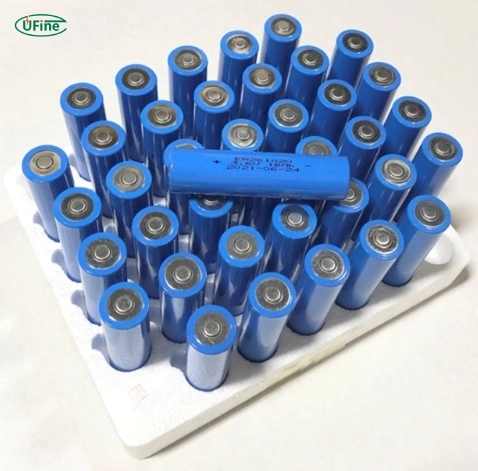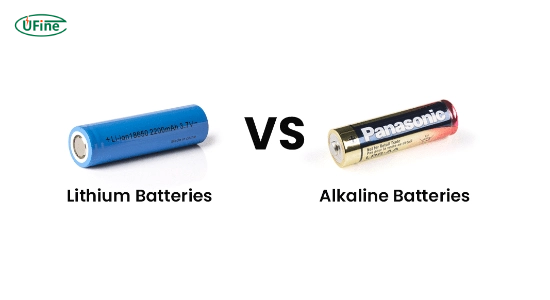
- Part 1. What are double A lithium batteries?
- Part 2. Why are double A lithium batteries ideal for photographers?
- Part 3. How do lithium batteries compare to alkaline batteries?
- Part 4. How to choose the right double A lithium batteries for your camera gear?
- Part 5. Practical use cases for double A lithium batteries in photography
- Part 6. Tips for maximizing the lifespan of your lithium batteries
- Part 7. Are rechargeable double-A lithium batteries worth it?
- Part 8. Common myths about double A lithium batteries
- Part 9. FAQs
Photography is an art form that thrives on precision, creativity, and reliability. For photographers, having the right gear is paramount, including choosing the best power source for their equipment. Regarding portable power, double-A lithium batteries are often overlooked but are a smart choice for photographers. They combine durability, efficiency, and convenience, making them an essential part of any photographer’s gear bag.
In this article, we’ll dive into everything you need about double A lithium batteries for camera gear. We’ll cover everything from understanding their advantages to tips for maximizing their lifespan. Whether you’re a seasoned pro or an amateur photographer, choosing the right battery can significantly improve your workflow and reliability.
Part 1. What are double A lithium batteries?
Double A lithium batteries are compact, cylindrical batteries that store energy using lithium-based chemistry. Unlike traditional alkaline AA batteries, lithium batteries are lighter, longer-lasting, and more reliable under extreme conditions. They are often used in portable devices such as cameras, flash units, and high-power gadgets like LED video lights, making them an excellent choice for camera batteries.
Key features of double A lithium batteries:
- High energy density: They store more power than alkaline batteries of the same size.
- Lightweight design: Ideal for photographers who carry gear for long periods.
- Temperature resistance: Perform well in extreme hot or cold weather.
- Long shelf life: They can retain their charge for years without significant power loss.
A Comprehensive Guide to Camera Battery
Part 2. Why are double A lithium batteries ideal for photographers?
Photographers require batteries that can withstand high energy demands and deliver consistent performance. Double A lithium batteries shine in this regard.
- Reliable power for high-drain devices: Cameras, external flashes, and other photography equipment often need high-drain power sources. Lithium batteries provide a steady voltage output, ensuring your gear operates at peak efficiency without sudden drops in power.
- Lightweight and travel-friendly: Photographers often carry their gear across long distances. Double A lithium batteries are lighter than their alkaline counterparts, perfect for reducing overall weight while traveling.
- Performance in extreme environments: Whether you’re shooting in freezing mountain ranges or scorching deserts, lithium batteries maintain their performance. Unlike alkaline batteries that may fail in extreme temperatures, lithium batteries thrive where others fall short.
Part 3. How do lithium batteries compare to alkaline batteries?
When choosing a battery, many photographers wonder: Are lithium batteries better than alkaline batteries? The answer is a resounding yes, especially for professional use. Here’s a comparison of their key differences:
- Energy density: Lithium batteries have a higher energy density, meaning they last longer than alkaline batteries of the same size.
- Weight: Lithium batteries are significantly lighter, which is beneficial for portable camera gear.
- Shelf life: When stored, lithium batteries can last up to 10 years, while alkaline batteries typically last 5–7 years.
- Performance in extreme temperatures: Lithium batteries perform well in hot and cold environments, whereas alkaline batteries struggle in extreme conditions.
- Cost: Lithium batteries are more expensive upfront but are more cost-effective in the long run due to their durability and longer lifespan.
Comparison Table: Lithium vs. Alkaline Batteries
| Feature | Lithium Batteries | Alkaline Batteries |
|---|---|---|
| Energy density | High | Moderate |
| Weight | Lighter | Heavier |
| Shelf life | Up to 10 years | 5–7 years |
| Performance in cold | Excellent | Poor |
| Performance in heat | Excellent | Poor |
| Cost | Higher upfront cost | Lower upfront cost |
Part 4. How to choose the right double A lithium batteries for your camera gear?
When selecting batteries for your camera gear, it’s essential to consider your specific needs and shooting style.
- Check compatibility with your devices: Not all camera equipment supports lithium batteries. Always check the manufacturer’s guidelines to ensure compatibility.
- Prioritize reputable brands: Invest in batteries from trusted brands like Energizer, Duracell, or Panasonic. These brands are known for their quality and reliability.
- Look for rechargeable options: If you’re a frequent photographer, rechargeable lithium batteries can save you money and reduce waste. They offer the same advantages as disposable lithium batteries but allow multiple charging cycles.
Part 5. Practical use cases for double A lithium batteries in photography
Double A lithium batteries are not just for cameras. Here are some practical use cases where they shine:
- External flashes: Provide consistent power for rapid flash recycling.
- Wireless triggers: Ensure reliable communication between camera and flash.
- LED lights: Deliver long-lasting performance for video shoots.
- Backup power: Serves as an emergency power source during extended shoots.
Part 6. Tips for maximizing the lifespan of your lithium batteries
To get the most out of your double A lithium batteries, follow these simple tips:
- Store them correctly: Keep your batteries in a cool, dry place to prevent heat or moisture damage. Avoid leaving them in direct sunlight or inside a hot car.
- Avoid mixing old and new batteries: Combining old and new batteries can lead to uneven power distribution, damaging your devices or reducing battery efficiency.
- Remove batteries when not in use: If you’re not using your camera gear for an extended period, remove the batteries to prevent leakage or corrosion.
- Use battery cases: Store spare batteries in protective cases to prevent accidental short-circuiting or damage.
Part 7. Are rechargeable double-A lithium batteries worth it?
Rechargeable lithium batteries are an eco-friendly and cost-effective alternative to disposable options. While the upfront cost is higher, they can be recharged hundreds of times, making them ideal for photographers who frequently shoot.
Benefits of rechargeable lithium batteries:
- Reduced waste: Fewer batteries end up in landfills.
- Lower long-term costs: Save money by reducing the need for replacements.
- Consistent performance: Deliver the same power output as disposable lithium batteries.
Part 8. Common myths about double A lithium batteries
Several misconceptions about lithium batteries may deter photographers from using them. Let’s debunk these myths:
- Lithium batteries are unsafe: Modern lithium batteries are designed with advanced safety features to prevent overheating, leaks, or explosions. As long as you use reputable brands, they are entirely safe.
- Lithium batteries are too expensive: While they have a higher upfront cost, their longevity and performance make them a better investment over time.
- Lithium batteries are only for professionals: Amateur photographers can also benefit from the reliability and convenience of lithium batteries, especially for extended trips or high-drain devices.
Part 9. FAQs
-
Can I use double A lithium batteries in all my photography gear?
It depends on the device. While most cameras and flashes are compatible, always check your equipment manual to ensure lithium battery compatibility. -
Are rechargeable lithium batteries better than disposable ones?
Rechargeable batteries are more cost-effective and environmentally friendly, but disposable lithium batteries may offer slightly better performance for one-time use. -
How long do lithium batteries last in camera gear?
Lithium batteries can last up to twice as long as alkaline batteries, depending on the device and usage. -
Do lithium batteries work in cold weather?
Lithium batteries perform exceptionally well in cold environments, making them ideal for outdoor photographers. -
Are lithium batteries recyclable?
Yes, many recycling programs accept lithium batteries. To minimize environmental impact, dispose of them at an authorized recycling center.
Related Tags:
More Articles

Big Square Battery Safety Standards You Must Know
Learn key safety standards for big square batteries to avoid fire risks, shipping delays, and compliance issues in EV, industrial, and energy storage projects.
Big Square Battery Applications in Solar & Industrial Equipment
Big square batteries deliver high capacity, stable output, and long life for solar, industrial, and backup power. Explore key uses and advantages.
Big Square Battery vs Cylindrical Battery: Complete 2025 Guide for EVs, ESS & Industrial Devices
Choosing the right battery is key for designers and engineers. Compare big square vs cylindrical batteries to find the best fit for your application.
How to Choose the Right Big Square Battery for Your Device?
If you’re choosing a big square battery for EVs, solar, or mobility devices, this guide helps you pick the right solution for real-world needs.
Big Square Battery Complete Guide: Types, Uses & Buying Tips
If you are choosing a big square lithium battery for EVs, solar, RVs, or AGVs, this guide helps you select the right NMC, LFP, or LTO solution with examples.




